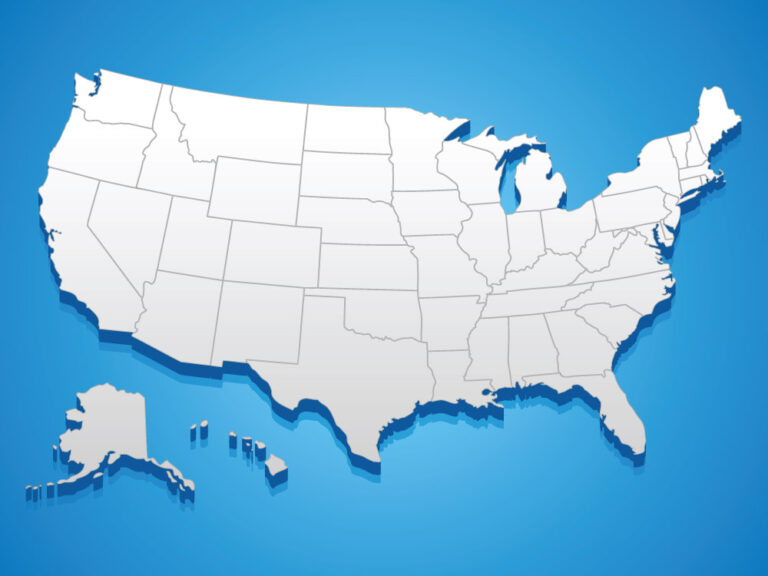Each state is a little different in terms of the way it handles sales tax, and this includes the determination of whether or not shipping charges are taxable. The following is a state-by-state breakdown of the taxability of shipping, handling and any other charges associated with the delivery of taxable items shipped to the purchaser.
It should be noted that the following regulations apply only to shipments of goods that are already subject to sales tax under the laws of the state in question. No state requires sales tax to be collected on shipping charges associated with the delivery of only non-taxable items.
Alabama – Shipping is taxable if the delivery is made in a vehicle owned or leased by the seller. It does not need to be included in the taxable total, however, if the delivery is through a common carrier, and if charges for delivery are listed separately on the invoice or receipt.
Alaska – There is no state sales tax in Alaska, but local jurisdictions including counties, cities, school districts, and other special purpose districts are permitted to levy their own sales taxes if they choose. These localities have broad discretion to structure their tax laws in whatever way they see fit, and so it’s possible that shipping charges would be taxable in some of these areas and not in others. This is only an issue, however, if you are shipping to a part of Alaska that has a sales tax, and much of the state does not.
Arizona – Freight charges in Arizona are not subject to sales tax as long as they are listed separately on the invoice or receipt. Handling charges are taxable, though, and if those two charges are lumped together into one amount, the cost of both is part of the taxable total.
Arkansas – Freight charges are taxable in Arkansas, as they’re considered part of the gross receipts from the sale. The only condition under which they would not be taxable is if delivery was through a common carrier who billed the purchaser directly without going through the retailer.
California – As long as they are stated separately on the invoice and not more than the actual cost of delivery, shipping charges are not subject to sales tax in California. Delivery must also be through a common carrier, and handling charge are taxable, so they must be listed separately as well.
Colorado – Colorado does not tax the cost of shipping as long as it is listed separately on the invoice, and the seller allows the purchaser to pick the delivery option they prefer.
Connecticut – Shipping is taxable in Connecticut regardless of delivery route or how it is listed on the invoice or receipt.
District of Columbia – DC’s General Information for Businesses – Sales and Use Tax brochure lists delivery as a taxable service, unless the delivery is of goods for resale and a District of Columbia resale certificate has been issued.
Delaware – Delaware’s gross receipts tax applies to the total revenue received from a sale, and that includes any shipping or delivery charges billed to the customer.
Florida – Charges for delivery of a taxable purchase in Florida are subject to sales tax unless they are separately stated on the invoice and there is an option for the purchaser to pick up the item in order to avoid the charges. If no such option exists, the delivery charges are considered a service being sold as part of the total purchase, and so are subject to sales tax.
Georgia – Georgia considers delivery charges to be part of the total cost of the purchased item, and so they are subject to sales tax.
Hawaii – Hawaii’s general excise tax (GET) applies to shipping and handling charges whether or not they’re listed separately.
Idaho – Shipping and handling charges are not taxable in Idaho as long as they’re listed separately from the purchase price of the item.
Illinois – In Illinois, shipping and delivery charges may be excluded from the taxable purchase price of an item only if the purchaser has the option to avoid those charges through an action such as picking up the item in person. If no such option exists, the delivery charges can’t be separated from the purchase price, and so are taxable.
Indiana – Delivery charges are taxable in Indiana, as they are considered part of the gross receipts of the sale. The only exception to this for taxable purchases is if delivery is made through the US Postal Service and the cost of the associated postage is listed separately on the invoice.
Iowa – Shipping and delivery charges are not taxed in Iowa as long as they are listed separately on the invoice or receipt.
Kansas – Kansas considers shipping charges to be part of the total purchase price of the item, and so they are subject to sales tax in the state.
Kentucky – Shipping charges are taxable in Kentucky if delivery is made by the seller, but not if it is made through common carrier and listed separately on the invoice. Because handling is taxable regardless of delivery method, however, a combined shipping handling charge will be subject to sales tax.
Louisiana – Shipping and handling charges are taxable in Louisiana, as they are considered part of the sales price since the sale could not be completed without them.
Maine – Maine generally considers delivery charges to be part of the total cost of a taxable sale unless the shipment goes directly from the seller’s place of business to the purchaser, the charges for transportation are listed separately, and the delivery is made through a common carrier, contract carrier, or the US Postal Service.
Maryland – Shipping charges, when stated separately on an invoice or receipt, are not taxed in Maryland, but handling charges are. If these two charges are combined, however, the entire total is taxed.
Massachusetts – Charges for shipping and handling in Massachusetts are not subject to sales tax as long as they are stated separately.
Michigan – As of April 26, 2023, shipping and delivery charges are no longer taxable in Michigan.
Minnesota – All types of delivery charges are considered taxable in Minnesota.
Mississippi – Shipping, handling, and other types of delivery charges are subject to sales tax in Mississippi.
Missouri – In Missouri, delivery charges are taxable if they are “intended to be part of the sale of the tangible personal property.” In this context, shipping and handling charges are taxable whether they are listed separately or not unless they are not part of the sale. This can be determined, according to the state, by evaluating:
- When the title passes from the seller to the purchaser
- Who assumes the risk of loss during shipping
- Who controls the cost and means of shipping
- Whether the seller derives financial benefit from shipping
Montana – Because Montana has no state sales tax, there is no tax on shipping and handling charges for deliveries to buyers in Montana.
Nebraska – Charges for “delivery, freight, postage, shipping, handling, and other service charges” are taxable in Nebraska. An exception to this is the charge for delivery through the US postal service when that charge is listed separately on the invoice.
Nevada – While handling and associated charges are taxable in Nevada, shipping charges are not as long as they are listed separately. Combined charges for shipping and handling are subject to sales tax.
New Hampshire – New Hampshire has no state sales tax, and so shipping and handling are not taxed on deliveries made in the state.
New Jersey – Shipping and handling charges are subject to sales tax in New Jersey. Shipments that contain both taxable and non-taxable items should have sales tax added for an appropriate portion of the total shipping and handling charges based on either the weight or total cost of the taxable goods included.
New Mexico – Freight charges, including all shipping, handling, and delivery charges, are subject to New Mexico’s gross receipts tax, with the only exception being when the buyer pays the carrier directly without going through the seller.
New York – Charges for shipping or delivery are taxable in New York. When a shipment contains both taxable and non-taxable goods and the shipping charges for each portion are listed separately, only those for the taxable portion are subject to sales tax. However, if only one shipping charge is listed for the entire order, the total of that charge is taxable.
North Carolina – Any shipping and handling charges that are connected to the sale of taxable goods in North Carolina are also subject to tax.
North Dakota – North Dakota considers freight and delivery charges to be part of the purchase price of tangible personal property, and as such, it is subject to sales tax.
Ohio – Ohio considers shipping and handling charges to be part of the total purchase price of the item, making them taxable when the goods shipped are taxable.
Oklahoma – Oklahoma does not consider shipping and handling charges to be taxable as long as they are listed separately on the invoice.
Oregon – There is no sales tax in Oregon, and so shipping and handling are not taxed either.
Pennsylvania – Shipping and handling charges are subject to sales tax in Pennsylvania, and this is true even if the shipment in question contains both taxable and non-taxable items. Shipping and handling charges on shipments of only non-taxable items are not taxed.
Rhode Island – Charges for preparation and delivery are taxable in Rhode Island.
South Carolina – Any charges associated with delivery in South Carolina are taxable. The only exception to this is if the buyer takes legal responsibility for the shipment as soon as it leaves the seller’s location as opposed to when it reaches its final destination.
South Dakota – Delivery charges are taxable in South Dakota whether or not they are listed separately on an invoice.
Tennessee – Tennessee considers delivery charges to be part of the total sales price of an item, and as such, they are subject to state sales tax.
Texas – Shipping and delivery charges are taxable in Texas.
Utah – Transportation or freight charges on deliveries in Utah are not subject to sales tax as long as they are listed separately on the invoice.
Vermont – Delivery charges are taxable in Vermont even when they are listed separately on the invoice, as they are considered part of the purchase price of the item.
Virginia – Shipping charges that are listed separately on an invoice are not taxable in Virginia. Handling is taxable, however, and so a combined charge for shipping and handling would be subject to state sales tax.
Washington – All costs associated with delivery of an item, including shipping and handling, are taxable in Washington.
West Virginia – West Virginia considers any costs associated with delivery of an item to be part of the total purchase price, and so those shipping and handling charges are subject to sales tax.
Wisconsin – Shipping and handling charges, regardless of the route of delivery, are subject to sales tax in Wisconsin.
Wyoming – Charges for shipping and handling are not taxable in Wyoming as long as they are listed separately on the receipt or invoice.
As you can see, shipping tax differs by state. The question “is shipping taxed?” cannot be answered at a national level, but depending on where an order goes, you can figure out whether to charge tax on shipping and handling.






